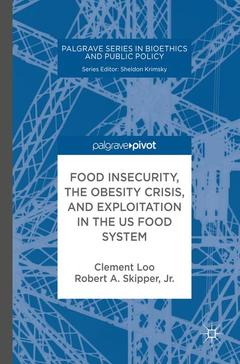Description
Food Insecurity, the Obesity Crisis, and Exploitation in the US Food System, 1st ed. 2017
Palgrave Series in Bioethics and Public Policy Series
Authors: Loo Clement, Skipper, Jr. Robert A.
Language: English
Subjects for Food Insecurity, the Obesity Crisis, and Exploitation in...:
Approximative price 58.01 €
In Print (Delivery period: 15 days).
Add to cart93 p. · 14.8x21 cm · Hardback
Description
/li>Biography
/li>Comment
/li>
Takes on the current interest in food, food security, and food justice in both academia and popular culture
Focuses on low-income communities and disparities in their access to nutritionally-dense vs. calorically-dense foods
Expands the conversation by demonstrating the importance of participative disparities
Includes supplementary material: sn.pub/extras
These books may interest you

Food Security and Nutrition 170.55 €

Food Insecurity and Public Health 208.65 €


